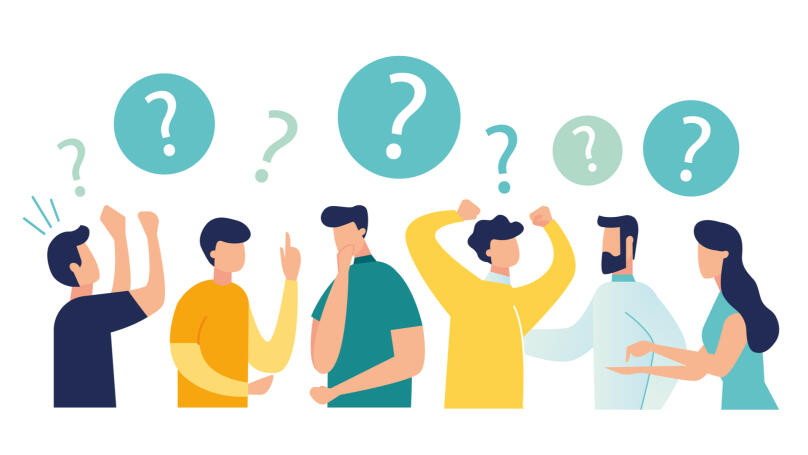What are the right questions to ask in sales?
The ability to ask the right questions is one of the essential skills in sales.

You want to avoid interactions with potential customers turning into monologues, or, on the flip side, firing too many questions at them. The key is to know at what stage of the negotiations to ask questions, and which questions to ask. So, let's take a look at the main ones.
First, ask for permission
Tell the customer that you're asking questions to help, and not to waste their time. Using the simple phrase "Let me ask you a few questions so that we can find the most suitable option for you." neutralises a possible adverse reaction from your customer.
Otherwise, in response to simple questions, they may start to become confused or angry: "Why did you ask that? I don't think this has anything to do with the subject of this meeting. Why should I tell you this? You have spoken your offer already; we won't waste time." This dDoesn't seem like a productive negotiation to me.
Types of questions
Open questions
By asking open-ended questions, you expect to receive a full, detailed answer. A distinguishing characteristic of open-ended questions is that they begin with question words: who, what, how, where, when, or why. For example:
"What are the best-selling items from your entire product range?"
"What criteria do you use to select suppliers?
Using open questions involves the customer in communication; they encourage dialogue while finding out as much information as possible. Always ask them at the beginning of a conversation. However, asking open questions about abstract topics. For instance, it would be a mistake to ask a question like "What do you know about our company?" would be a mistake at a business meeting because this is a waste of time, both for you and your client.

Closed questions
These types of questions only allow a brief "Yes" or "No" answer in response:
"Are you interested in internal training for the company's employees?" "If we reduce the price, are you ready to purchase the entire product line?"
Closed questions are always asked at the end of a sale. Using these types of questions confirm the needs and worries of a customer, and when it's necessary to clarify the details. You won't be able to ask only closed questions or use several closed questions in a row: if you do you won't get any essential information from your customer, and you won't understand their needs. Meaning, you won't be able to make an offer that will interest them.

Alternative questions
These types of questions are a cross between open and closed questions; the answers to these questions provide you with more information than closed questions, but less information than open ones. Alternative questions contain the word "or" (or its use is implied) and offer a relatively detailed answer from several different options: "Do you use a simplified or general taxation system?" "How many boxes do we include in the first order seven, ten, or fifteen?" In this instance, your customer isn't required to justify their choice in their response; this right remains their own.
Alternative questions are "average" in terms of the degree of psychological pressure put on a customer: you're putting the customer in front of a necessary choice. Nevertheless, there's space for this choice (as opposed to closed questions).

SPIN questions
Neil Wrexham classified questions according to their function:
- Situational questions (to contact the customer and identify their needs). These are open questions and a few closed ones, like "What's your company's weekly performance?" After you've identified the customer's main interest and set them up for communication, you move on to the problematic issues to find out the primary customer needs.
- Problematic questions pinpoint the client's problem. After analysing the answers to the situational questions, pay attention to what the customer mentions the most frequently: are they dissatisfied with the delivery time or is the supplier completely disrupting them? Are the costs too high? Ask problematic questions, focusing on your customer's problems and concerns: "Are you satisfied with the price you are currently paying?" If you're unable to identify the customer's needs, then prepare a list of standard questions that address different problems.
- Implied questions help you to understand how significant the problem is for the customer and what will happen if it's not resolved. These questions are difficult to think of in advance.
Only if you have enough experience, can you establish a causal link between your customer's problem and the solution. Implied questions aim to make the problem so apparent that the customer recognises that it can't be left unresolved: "Did the problems you mentioned lead to the loss of at least one client?"
- Needed questions, otherwise known as "guided questions," helps to close the deal and the customer expresses all the advantages that they receive from working with you: a low price, fast delivery, special pricing conditions, etc.).

SPIN-sales take a lot of time from the seller to put into practice, so it makes no sense to use them in the mass segment when the purchase price is low, and the demand for the product is already high.
Questions to end the conversation
Don't ask direct questions at the end of a meeting with a customer like:
- "Is it a deal?"
- "Are we in agreement?"
- "When do we sign a contract?"

Direct questions can be seen as pressure and that you're pushing the customer to make a decision. Ask for technical details that include your further cooperation, for example:
- "When will our designer be able to visit you?"
- "Which address should I send the offer to?"
Finally, remember that by correctly combining all the presented forms of questions in communications with your customers, you'll increase the efficacy of your sales.
Share this with your friends via:
Latest News

A significant stage in the development of the alternative education system has begun in West Northamptonshire in the UK: the County Council is actively calling on parents, guardians, and trustees to participate in shaping the future of this key area.

Outwoods Primary School in Atherstone, Warwickshire, having experienced deep sadness after the loss of their famous cat, Silla, has found solace in a new pet – a Maine Coon named Aloysius O’Hara.

In modern universities, artificial intelligence, and in particular ChatGPT, is rapidly transforming from a controversial tool into a full-fledged student assistant.

An innovative educational project is gaining momentum in UK primary schools, aiming to change attitudes towards video games.

The Massachusetts Institute of Technology (MIT) presents MIT Learn – a revolutionary online platform that opens a “new front door” to access university knowledge and resources.












 Test. Check Your Social Media Dependency Level!
Test. Check Your Social Media Dependency Level!
 Test: What Business is Right For You?
Test: What Business is Right For You?
 “I’m Here for the Long Haul”: When Loyalty to a Company Becomes Toxic
“I’m Here for the Long Haul”: When Loyalty to a Company Becomes Toxic
 Test: How Prone Are You to Abusive Behavior as a Manager?
Test: How Prone Are You to Abusive Behavior as a Manager?
 Test. What superpower would you possess if you were a superhero?
Test. What superpower would you possess if you were a superhero?
 Test. What Should You Let Go of Before Winter Ends?
Test. What Should You Let Go of Before Winter Ends?

